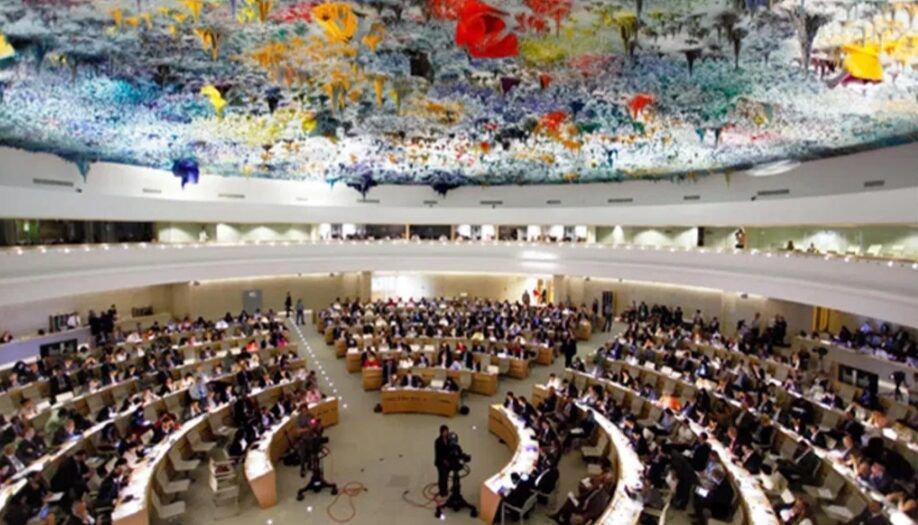Press Release
SALAM DHR organized a workshop in preparation for Bahrain’s Universal Periodic Review (UPR) next year
In the context of SALAM DHR’s commitment to promoting awareness, training and urging people to demand justice and uphold universal principles of dignity and respect through the protection of democracy and human rights, a workshop about Bahrain Universal Periodic Review (UPR) has been organised in Arabic, on September 22, 2021, from 7:00 to 9:30 pm Bahrain time. The number of participants reached 25, including lawyers, members of Bahraini human rights organizations, human rights activists, and students. The speakers in the workshop were: Sayed Yousif Al-Muhafdha, the Vice President of SALAM DHR, Baqer Darwish, President of the Bahrain Forum for Human Rights, and two members of SALAM DHR Lena Haitham and Reem Al-Zuhairi.
From his residence in Berlin, Sayed Yousif Al-Muhafdha explained the human rights standards in writing UPR shadow reports and how to identify recommendations that were not implemented and make propositions to the country concerned with the review, as well as the form of testimonies that consider the basic principles. At the beginning of his presentation, he explained about the UPR’s mechanism within the international human rights mechanisms to monitor the human rights situation in all countries. He dealt with the three critical reports prepared by several parties: the state report, the report of the United Nations High Commissioner for Human Rights (OHCHR), and the report of other stakeholders (human rights organizations). Al-Muhafdha referred to the parties to which reports are sent, how and when they are submitted, in addition to the form and framework of the report according to the general standards and measures that are accepted.
The President of Bahrain Forum for Human Rights, Baqer Darwish, from the Lebanese capital, Beirut, addressed the recommendations of UPR that were presented to Bahrain in its third session in 2017, and gave a detailed explanation of the extent of their implementation to date, noting that these recommendations are the keys to communication with diplomatic missions by civil society, saying that they primarily reflect the interest of each particular country in some of the human rights issues mentioned in the recommendations. Darwish pointed out that the topics included in the recommendations are 42 human rights issues, and the most prominent are: Acceptance of international standards: (23) recommendations from (29) countries, of which only (5) were supported, the constitutional and legislative framework : (29) recommendations from (28) countries, of which (25) were supported, and the subject of the death penalty: (4) recommendations from (12) countries, of which only (one) was supported, while each of the rest of the topics received less than (10) recommendations from less than (10) countries. In addition, Darwish mentioned the human rights issues included in the recommendations: the constitutional and legislative framework, impunity, voluntary goals of human rights and other obligations, cooperation with special procedures, cooperation with civil society, cooperation with treaty bodies, education in the field of human rights – general, racial discrimination, freedom and security – general, right to peaceful assembly, right to health – general, right to work, right to participate in public affairs and right to vote, right to an effective remedy, rights to identity and nationality, civil rights and political rights – general measures of implementation, National Human Rights Institution (NHRI), administration of justice and fair trial, enforced disappearances, freedom of movement, freedom of opinion and expression, freedom of association, prohibition of torture and cruel, inhuman or degrading treatment, human rights and counter-terrorism, National Action Plans on human rights (or specific areas), conditions of detention, the death penalty, acceptance of international standards, follow-up to special procedures.
In two other parts of the workshop, Lena Haitham and Reem Al-Zuhairi from Beirut, discussed the mechanism, methodology and date of submission of the relevant report to the Working Group on the Universal Periodic Review, the deadlines of submission of stakeholders’ reports, including the timetable for engaging in the related UPR in the next session, and the stage of receiving reports. The report’s methodology was reviewed in terms of the form of individual and joint reports, the method of writing them, the principles adopted in the Charter of the United Nations, the Universal Declaration of Human Rights, and other instruments, pledges and voluntary commitments made by states and the provisions of international law. The topics covered by the reports and how they can be divided were explained with a review of a model for the shadow report of SALAM DHR in a previous session. At the end of the workshop, there were open discussions and questions.


 العربية
العربية Français
Français Deutsch
Deutsch